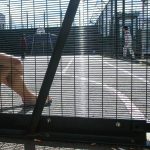impact
What do you try to change?
Our research is a massive H2020 project that in the coming months will map the integration of thousands of migrant children across six EU countries. The results are expected to inform future policy discussions and set the stage for enhancing measures to best integrate migrant children.
-
evidence
 This is a new project - no evidence has been supplied.
This is a new project - no evidence has been supplied.
-
advice

Tell us your advice on doing participation activities - what worked well, what you enjoy, what is inclusive?
Because we engaged with children of a wide age range, we sought to tailor activities accordingly, including age-appropriate ice-breakers. The younger children communicated largely via drawings in response to questions and prompts, while the older groups were guided by open-ended questions to discuss the topics in more depth. We kept groups small to encourage participation from everyone, and were mindful of those who preferred to stay quiet or communicate via their drawings or written responses. We were delighted to see how readily the older cohort engaged in lively discussion. All of these fed into our researchers' analysis for determining the most relevant indicators for their inclusion and well-being, and these indicators will be used in the upcoming data collection across six countries. We put great value on participatory approaches in both answering and asking of questions.


